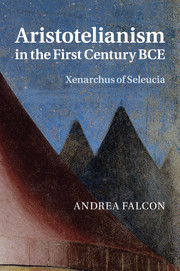Conclusion
Published online by Cambridge University Press: 05 January 2012
Summary
Aristotle's writings had a limited circulation in the Hellenistic period. Strange as it may seem to us today, the most common attitude toward Aristotle at the time was not opposition or resistance to his ideas, but rather indifference. The situation changed in the first century bce. The so-called return to Aristotle is one of the most conspicuous features of the century. This return marked a new beginning in the Peripatetic tradition, which is clearly divided into a Hellenistic and a post-Hellenistic period. The post-Hellenistic period begins with the return to Aristotle in the first century bce and ends with Alexander of Aphrodisias in the late second and early third centuries ce.
The division of the Peripatetic tradition into two phases is not a modern invention but was already recognized in antiquity. The ancient explanation for this curious phenomenon was that the loss of Aristotle's books deprived the Hellenistic Peripatos of its most important theoretical tools. Without these books, the Peripatos could not keep up with the other schools. When they became available in the first century bce, the school of Aristotle could flourish again. It has been pointed out that this explanation is based on the anachronistic assumption that serious philosophizing requires direct attention to a written text. While this is a common assumption in the post-Hellenistic return to Aristotle, it has no parallel in the Hellenistic era. Although anachronistic, it points to a central feature of the post-Hellenistic return to Aristotle: it took the form of a vigorous engagement with Aristotle's writings. At least in the Peripatetic tradition, this was a strikingly new development.
- Type
- Chapter
- Information
- Aristotelianism in the First Century BCEXenarchus of Seleucia, pp. 199 - 204Publisher: Cambridge University PressPrint publication year: 2011



